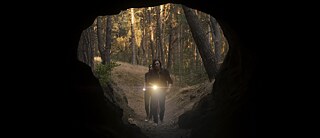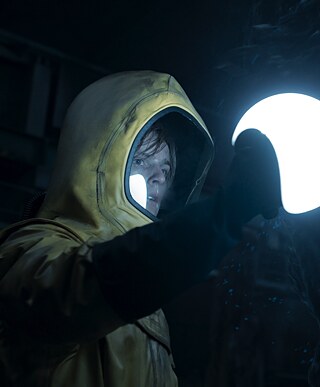Netflix review
Asking tough questions & making complex connections: Dark Season 2

Following four families in a small German town as they search for missing children, Netflix’s standout German-language sci-fi drama Dark proves just as compelling — as well as dramatic and philosophical — in its twisty second season.
By Sarah Ward
As a series that lingers in caves, darkened rooms and around a nuclear power plant in a forest-lined small German town, it’s easy to take Dark’s title literally. That the Netflix show also ponders humanity’s darkest impulses, through a battle between the nobly intentioned and the darkly aligned that centres around missing children, also supports that reading. This is a series set in dark places that focuses on fighting dark forces, both internally and externally.
But, as the program’s eight-episode second season makes increasingly apparent, the sci-fi thriller stares into the dark in another manner too. Telling a tale predicated upon questions — as all time-travel stories do — it ponders the existential worries we each ask ourselves in the thick of the night, in the glaring absence of sleep, when darkness is utterly inescapable even if we do turn on the light.
What legacy will we each leave when our time comes, if we even truly leave anything at all? How do our actions now, from the past and in the future impact our loved ones? Are their lives changed, bettered or worsened by our presence? What ripples do each of our choices, successes and mistakes cause? Will they leave aftershocks not just for days and years, but for decades and longer? Is each individual life, the messy minutiae that comes with it, and the connections to countless other people and their equally chaotic existences, all worth it?
Many of Dark’s characters stare into space at times, pondering the plot’s twists and turns; however they may as well be ruminating over the above trains of thought. Series creators Baran bo Odar and Jantje Friese certainly are, the former directing every episode, the latter co-scripting each, and these ideas bubble away throughout.

EXISTENTIAL CONCERNS, EVERYDAY DRAMAS
These notions don’t just fester in a broad sense. Instead, Bo Odar and Friese weave them into their labyrinthine narrative. After the big revelations that concluded the first series, Winden high-schooler Jonas Kahnwald (Louis Hofmann) has a mission that spans multiple periods: 2019/2020, the show’s entry point; 1986/1987, the years that his crush Martha Nielsen’s (Lisa Vicari) younger brother Mikkel (Daan Lennard Liebrenz) has wandered back to; 1953/1954, where other kids are turning up dead; 1921, as a religious sect takes hold in the town; and 2053, when the area has become a post-apocalyptic wasteland.That’s a considerable number of times and threads to keep track of, as amplified by the show’s even lengthier list of characters, but it’s how they’re all linked that sits at Dark’s core. In a straightforward sense, puzzling who fits where and when keeps the series’ wheels turning. Digging deeper, how each character’s actions affects those around them is the show’s real concern.
Accordingly, the time-bending mystery follows its breadcrumbs through the woods, leaving intertwining ribbons that tie people together and reach across years, while also using its science-fiction concept as scaffolding for the show’s meatier focus. In other words, Dark is a multi-generational drama that charts the flow-on effects of deeds and changes over more than a century as they all seep through its insular setting. Unlike the great work of literature that also does exactly that - One Hundred Years of Solitude by Colombian author Gabriel García Márquez - this just happens to be a tale where a teenager can converse with a stranger who turns out to be his older self, all while searching for a lost child that happens to be his own just-dead father and where a young girl can grow up to be her own mother’s mother.
SCI-FI LOOPS, INTERPERSONAL WEBS

It all keeps coming back to Jonas, of course, as he zips back and forth through time and takes on different guises as he gets older. He gains more information, too, and everything in his life takes on a different flavour with each development. Amid the conspiracies, the creepy sects plotting to change the world, the experiments and murders, and the time-travel devices and the wormholes, this notion also stands out: that, as every puzzle piece falls into or out of place, one’s perception and experience changes in an irrevocable manner.
Dark finds countless ways to make this plain, all while continuing to muse over all the questions that linger in the show’s heart. It’s evident as Martha and Mikkel’s father Ulrich (Oliver Masucci), also a Winden police officer, keeps trying to find his lost boy. And, it’s there as his boss, local station chief, Charlotte Doppler (Karoline Eichhorn), also endeavours to solve the case but is continually forced to excavate her own past in the process. Naturally, the same applies in the tale of ex-power plant director Claudia Tiedemann (Lisa Kreuzer), as she attempts to save the world as a whole, as well as her cancer-stricken daughter Regina (Deborah Kaufmann). Along with the Kahnwalds, the show’s four main families live and breathe Bo Odar and Friese’s tough philosophical queries — and Dark couldn’t be more compelling as a result.
Thankfully, because this is a thorny, elaborate tale that hasn’t yet posed any definitive answers to its underlying mysteries, or finished exploring the darkness, shooting for the show’s third and final season is already underway. It’s slated to hit Netflix at a yet-to-be-announced date in 2020.